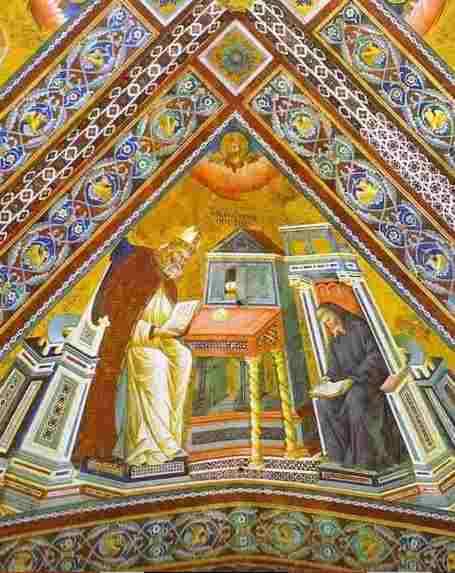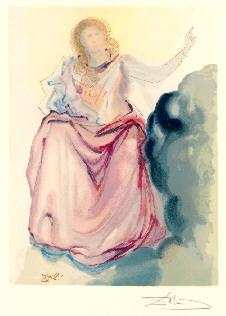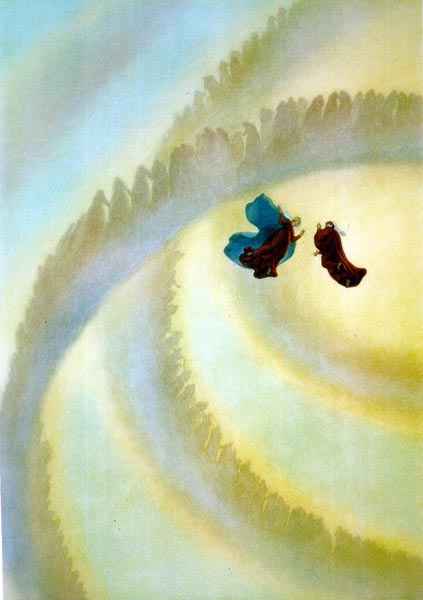 |
 |
 |
|
|
|
|
 |
 |
 |
|
|
|
|
| PAR04 |
|
|
|
|
| ........... | ....... G.GUAITA |
................................. H.W.LONGFELLOW |
...... .D.ALIGHIERI |
....... ... | ....... |
| 1
|
Tra
duj
mangè
ugualmént
apetitùs, distànt uguàl, prìma al murrìa 'd fam, n om lìbar ad decìdi ad sèrni quàl; |
Between
two viands, equally removed And tempting, a free man would die of hunger Ere either he could bring unto his teeth. So would a lamb
between the
ravenings Hence, if I held
my peace,
myself I blame not, |
Intra
due
cibi,
distanti
e
moventi d'un modo, prima si morria di fame, che liber'omo l'un recasse ai denti; |
| 4
|
e
cuzì,
tra
duj
lüf
starìa n agnèl, e 'd iün e 'd l'àut avénd uguàl pagüra; o ànche 'n can da càsa tra duj sèrf. |
sì
si starebbe
un agno intra due brame di fieri lupi, igualmente temendo; sì si starebbe un cane intra due dame: |
|
| 7
|
Dònca
se
mi
i
tazìva
am biàzim nén 'd rastè tra cuj duj dübi antarduà, e nànca 'm lod, paralizà mè iéra. |
per che,
s'i' mi
tacea, me non riprendo, da li miei dubbi d'un modo sospinto, poi ch'era necessario, né commendo. |
|
| 10
|
Mi
i
tazìva,
ma
scrìta
la dumànda a iàva 'n fàcia e 'nsèma al dezidéri tant evidént püsè che s' iéisa dìlu. |
I
held my peace; but my desire was painted Upon my face, and questioning with that More fervent far than by articulate speech. Beatrice did as
Daniel had
done And said: "Well
see I how
attracteth thee |
Io mi
tacea, ma 'l
mio disir dipinto m'era nel viso, e 'l dimandar con ello, più caldo assai che per parlar distinto. |
| 13
|
L'ha
fat
Beatrìs
mè
l'àva
fat Danièl, a Nabucodònozor paziàndji l'ìra che l'àva ingiüstamént fàlu 'nrabiè; |
Fé
sì
Beatrice qual fé Daniello, Nabuccodonosor levando d'ira, che l'avea fatto ingiustamente fello; |
|
| 16
|
e
lé
'm
dis:"Mi
i
vëd che i dezidéri ti è lì che 't tìru dès 'd na part e 'dl'àuta che ti t'è pü nén bon da fè paròla. |
e disse:
«Io
veggio ben come ti tira uno e altro disio, sì che tua cura sé stessa lega sì che fuor non spira. |
|
| 19
|
Ti
't
dìzi:"Se
i
cunsèrv
la vuluntà, mè l'è che la viulénsa 'd n àut la dév diminüìni 'l mérit che mi iù?". |
Thou
arguest, if good will be permanent, The violence of others, for what reason Doth it decrease the measure of my merit? Again for
doubting furnish
thee occasion These are the
questions which
upon thy wish |
Tu
argomenti: "Se
'l buon voler dura, la violenza altrui per qual ragione di meritar mi scema la misura?". |
| 22
|
Pö
ànche
ad
dübitè
at
dà ucaziòn che zmìa i tùrnu i ànimi a ia stéili, secònd che l'àva già pensà 'l Platòn. |
Ancor di
dubitar
ti dà cagione parer tornarsi l'anime a le stelle, secondo la sentenza di Platone. |
|
| 25
|
Ién,
'nsla to vuluntà, cùsti i questiòn
che ugualmént i pòntu;mi i tratarù adès prìma la pü periculùza. |
Queste
son le question
che nel tuo velle pontano igualmente; e però pria tratterò quella che più ha di felle. |
|
| 28
|
Al
Serafìn
ca
l'è
pü
vzin a Dìu, al Moisè, al Samüel e i duj Giuàn cul che 't völi, lasùma stè Marìa, |
He
of the Seraphim most absorbed in God, Moses, and Samuel, and whichever John Thou mayst select, I say, and even Mary, Have not in any
other heaven
their seats, But all make
beautiful the
primal circle, |
D'i
Serafin colui
che più s'india, Moisè, Samuel, e quel Giovanni che prender vuoli, io dico, non Maria, |
| 31
|
iàn
nén
'nti
n
àutar
cél an post divèrs da cul che iàn si spìrit che t'è vdü', e beàti i saràn stès nümar d' àni; |
non hanno
in altro
cielo i loro scanni che questi spirti che mo t'appariro, né hanno a l'esser lor più o meno anni; |
|
| 34
|
ma
tüti
's
tròvu
là
a urnè 'l prim cél e iàn vìta beàta diferénta secònd che i séntu 'n lur la Spìrit Sant. |
ma tutti
fanno bello
il primo giro, e differentemente han dolce vita per sentir più e men l'etterno spiro. |
|
| 37
|
Se
ti
tiu
vëdi
chi,
l'è nén sa sféra ch'i àbiu 'n sort, ma mèc par indichè che l'è pü bas al post che iàn an cél. |
They
showed themselves here, not because allotted This sphere has been to them, but to give sign Of the celestial which is least exalted. To speak thus is
adapted
to your mind, On this account
the Scripture
condescends |
Qui si
mostraro,
non perché sortita sia questa spera lor, ma per far segno de la celestial c'ha men salita. |
| 40
|
Cuzì
cunvén
che
's
pàrla
a la mént vòsa, parchè i ampréndi mèc travèrs i séns lònche pö l'intelèt av fa capì. |
Così parlar
conviensi al vostro ingegno, però che solo da sensato apprende ciò che fa poscia d'intelletto degno. |
|
| 43
|
A
l'è
par
cust
che
la Scritüra as piéga al livèl di vos séns, e pé e man a Dìu atribüìs, vulénd dì d'àut; |
Per
questo la Scrittura
condescende a vostra facultate, e piedi e mano attribuisce a Dio, e altro intende; |
|
| 46
|
e
Sànta
Céza
cun
aspèt
üman Gabriél e Michél av raprezénta, e cul àut che Tubìa a l'ha 'rsanà. |
And
Holy Church under an aspect human Gabriel and Michael represent to you, And him who made Tobias whole again. That which
Timaeus argues
of the soul He says the soul
unto its
star returns, |
e Santa
Chiesa con
aspetto umano Gabriel e Michel vi rappresenta, e l'altro che Tobia rifece sano. |
| 49
|
Cul
che
'l
Timéu
ad
i ànimi 'l razòn'a ià nén che fè cun lònche 't vëdi chi, parchè lü lònche 'l dis ànche lu pénsa. |
Quel che
Timeo de
l'anime argomenta non è simile a ciò che qui si vede, però che, come dice, par che senta. |
|
| 52
|
Al
dis
che
tùrna
l'ànima
a la stéila, e 'l crëd che cùla sìa distacàsi quànd che natüra l'ha asegnàla a 'n corp; |
Dice che
l'alma a
la sua stella riede, credendo quella quindi esser decisa quando natura per forma la diede; |
|
| 55
|
ma
fòrse
'l
so
pensé
'l völ dì quaicòs divèrs da lònche zmìa, e pöl ànche èsi cun intesiòn che tant iè nén da rìdi. |
Perhaps
his doctrine is of other guise Than the words sound, and possibly may be With meaning that is not to be derided. If he doth mean
that to these
wheels return This principle
ill understood
once warped |
e forse
sua sentenza
è d'altra guisa che la voce non suona, ed esser puote con intenzion da non esser derisa. |
| 58
|
Se
lü
'l
völ
dì
che a i céi l'atribüìs n' inflüénsa che sìa o bòn'a o gràma, fòrse dal vér lü 'l va nén trop luntàn. |
S'elli
intende tornare
a queste ruote l'onor de la influenza e 'l biasmo, forse in alcun vero suo arco percuote. |
|
| 61
|
'S
prinsìpi
mal
capì
andè
l'ha fat fòra strà quàzi tüt al mond, e Giòve Mercùrio e Màrte a iàn deificà. |
Questo
principio,
male inteso, torse già tutto il mondo quasi, sì che Giove, Mercurio e Marte a nominar trascorse. |
|
| 64
|
L'àutar
dübi
che
't
làsa
nén tranquìl, ià mén velén, parchè 'l cuntén n erùr che tant luntàn da mi 'l pöl nén purtèti. |
The
other doubt which doth disquiet thee Less venom has, for its malevolence Could never lead thee otherwhere from me. That as unjust
our justice
should appear But still, that
your perception
may be able |
L'altra
dubitazion
che ti commove ha men velen, però che sua malizia non ti poria menar da me altrove. |
| 67
|
Che
la
nòsa
giüstìsia
ingiüsta
a zmìa a i öc' ad vuj murtàj l'è n argumént ad féde e nén d'erética upiniòn. |
Parere
ingiusta la
nostra giustizia ne li occhi d'i mortali, è argomento di fede e non d'eretica nequizia. |
|
| 70
|
Ma
parchè
pöd
la
vòsa
inteligénsa bén penetrè andrén sa verità, sü lònche 't ciàmi ti, 't farù cuntént. |
Ma
perché
puote vostro accorgimento ben penetrare a questa veritate, come disiri, ti farò contento. |
|
| 73
|
Se
viulénsa
l'è
quànd
cul
che 'l sübìs al cuncéd pròpi niénte a chi lu sfòrsa, si ànimi, nén par cust a ién scüzà; |
If
it be violence when he who suffers Co-operates not with him who uses force, These souls were not on that account excused; For will is never
quenched
unless it will, Hence, if it
yieldeth more
or less, it seconds |
Se
violenza è
quando quel che pate niente conferisce a quel che sforza, non fuor quest'alme per essa scusate; |
| 76
|
la
vuluntà,
se
völ
da
bon, céd nén, ma fa mè 's vëd natüra fè 'ntla fiàma, se ànche mìla vòlti 'l vént lu storz. |
ché volontà,
se non vuol, non s'ammorza, ma fa come natura face in foco, se mille volte violenza il torza. |
|
| 79
|
Perciò
se
lé
la
céd
o tant o poc, la fòrsa vins; e cuzì custi iàn fat pudénd arpiè la vìa dal cunvént. |
Per che,
s'ella si
piega assai o poco, segue la forza; e così queste fero possendo rifuggir nel santo loco. |
|
| 82
|
Se
vuluntà
i
avéisu
avüla
'ntéra, mè cùla 'd san Luréns dzùra la grà, o 'd Mùzio che 'nsal föc l'ha tnì la man, |
if
their will had been perfect, like to that Which Lawrence fast upon his gridiron held, And Mutius made severe to his own hand, It would have
urged them
back along the road And by these
words, if thou
hast gathered them |
Se fosse
stato lor
volere intero, come tenne Lorenzo in su la grada, e fece Muzio a la sua man severo, |
| 85
|
i
avrìu
lur
mantnì
cùla
prumësa che i àvu nén lasài rispetè; ma na vòja tant fèrma l'è trop ràra. |
così l'avria
ripinte per la strada ond'eran tratte, come fuoro sciolte; ma così salda voglia è troppo rada. |
|
| 88
|
Da
si
paròli,
se
tezòr
t'è fàni mè che 't düvìvi, eliminà l'è stàta l'argumént che 'l pudìva distürbèti. |
E per
queste parole,
se ricolte l'hai come dei, è l'argomento casso che t'avria fatto noia ancor più volte. |
|
| 91
|
Ma
adès,
t'è
par
travèrs,
davànti a i öc' n ustàcul che da sul at pudrè nén ti süperè; 't sarìi strac tant prìma. |
But
now another passage runs across Before thine eyes, and such that by thyself Thou couldst not thread it ere thou wouldst be weary. I have for
certain put into
thy mind And then thou
from Piccarda
might'st have heard |
Ma or ti
s'attraversa
un altro passo dinanzi a li occhi, tal che per te stesso non usciresti: pria saresti lasso. |
| 94
|
Mi
i
son
sicür
d'avéi
bütàti 'n mént che 'n beàto, chi, al pöl nén dì 'd buzìi, parchè a 'l prim vér lü 's tròva sémp davzìna; |
Io t'ho
per certo
ne la mente messo ch'alma beata non poria mentire, però ch'è sempre al primo vero appresso; |
|
| 97
|
ma
ti
t'è
pudì
sénti
da Picàrda che al vél afesiunà l'è stat Custànsa; e cust a lònche 't dig zmìa cuntràri. |
e poi
potesti da
Piccarda udire che l'affezion del vel Costanza tenne; sì ch'ella par qui meco contradire. |
|
| 100
|
Tànti
vòlti,
o
fratèl,
l'è
capità che pr'evitè 'n perìcul, còntra vòja, lònche 's duvrìa nén, iàn düvì fè; |
Many
times, brother, has it come to pass, That, to escape from peril, with reluctance That has been done it was not right to do, E'en as Alcmaeon
(who, being
by his father At this point I
desire thee
to remember |
Molte
fiate già,
frate, addivenne che, per fuggir periglio, contra grato si fé di quel che far non si convenne; |
| 103
|
Alcmeòn,
pr'ezémpi,
pregà
dal
pàri 'd fè lònche l'ha fat, l'ha masà so màri; par nén pèrdi pietà l'è stat spietà. |
come
Almeone, che,
di ciò pregato dal padre suo, la propria madre spense, per non perder pietà, si fé spietato. |
|
| 106
|
Adès
i
völ
che
ti
't riflèti bén che quànd a vuluntà s' ünìs la forsa, pü nén 'lùra i pecà pölu scüzèsi. |
A questo
punto voglio
che tu pense che la forza al voler si mischia, e fanno sì che scusar non si posson l'offense. |
|
| 109
|
Vuluntà
pién'a
al
mal
pöl
nén cunsénti; ma mèc lé cunsént, quànd rezisténd, pagüra l'ha 'd caschè 'nti 'n mal pü gros. |
Will
absolute consenteth not to evil; But in so far consenteth as it fears, If it refrain, to fall into more harm. Hence when
Piccarda uses
this expression, Such was the
flowing of the
holy river |
Voglia
assoluta non
consente al danno; ma consentevi in tanto in quanto teme, se si ritrae, cadere in più affanno. |
| 112
|
Quànd
che
Picàrda
l'ha
parlà
cuzì, dla vuluntà asulüta la parlàva, mi dl'àuta; e tüti duj i dizùma 'l vér". |
Però,
quando Piccarda
quello spreme, de la voglia assoluta intende, e io de l'altra; sì che ver diciamo insieme». |
|
| 115
|
Cuzì
scurìva
ciàra
la
paròla dla funtàn'a da 'ndùa al vér derìva bütand an pas i dübi che mi iàva. |
Cotal fu
l'ondeggiar
del santo rio ch'uscì del fonte ond'ogne ver deriva; tal puose in pace uno e altro disio. |
|
| 118
|
"O
amùr
dal
prim
amùr,
o creatüra divìn'a - cuzì i dis - che cùi paròli di 'n föc ti ta ma scàudi sémp pü viv, |
"O
love of the first lover, O divine," Said I forthwith, "whose speech inundates me And warms me so, it more and more revives me, My own affection
is not so
profound Well I perceive
that never
sated is |
«O
amanza del
primo amante, o diva», diss'io appresso, «il cui parlar m'inonda e scalda sì, che più e più m'avviva, |
| 121
|
i
afèt
üman
ién
nén
cuzì prufònd, che gràsia a ti par gràsia i pöda réndi; ma a cul che 'l vëd e 'l pöl mi i las rispòndi. |
non
è l'affezion
mia tanto profonda, che basti a render voi grazia per grazia; ma quei che vede e puote a ciò risponda. |
|
| 124
|
Mi
lu
vëd
bén
che
mài l'è sudisfàta la nòsa mént se i fa nén ciàr cul vér che l'è mèc lü la véra verità. |
Io veggio
ben che
già mai non si sazia nostro intelletto, se 'l ver non lo illustra di fuor dal qual nessun vero si spazia. |
|
| 127
|
As
pòza
an
lé
mè
'l fa 'l leòn an tàn'a, tost che l'ha truvàla;e 'rtruvèla a pöl; se no parchè ni avrìa 'l dezidéri? |
It
rests therein, as wild beast in his lair, When it attains it; and it can attain it; If not, then each desire would frustrate be. Therefore springs
up, in
fashion of a shoot, This doth invite
me, this
assurance give me |
Posasi in
esso, come
fera in lustra, tosto che giunto l'ha; e giugner puollo: se non, ciascun disio sarebbe frustra. |
| 130
|
Par
cust
al
nas,
mè
'n piànta che l'arbüta, ai pé dal vér al dübi; e l'è natüra che après a lü an pùsa sémp pü sü. |
Nasce per
quello,
a guisa di rampollo, a piè del vero il dubbio; ed è natura ch'al sommo pinge noi di collo in collo. |
|
| 133
|
Cust
m'invìta
e
'm
dà
ànche sicürësa, cun reverénsa, dòna, a fè dumànda ad n'àuta verità che a mi l'è scüra. |
Questo m'invita,
questo m'assicura con reverenza, donna, a dimandarvi d'un'altra verità che m'è oscura. |
|
| 136 | Vurìa
savéj
se
l'om
pöl
sudisfè süstitüénd ai vut mancà, di bén che a la vòsa stadéra i sìu nén scars". |
I
wish to know if man can satisfy you For broken vows with other good deeds, so That in your balance they will not be light." Beatrice gazed
upon me with
her eyes And almost lost myself with eyes downcast. |
Io
vo' saper
se l'uom può sodisfarvi ai voti manchi sì con altri beni, ch'a la vostra statera non sien parvi». |
| 139 | Chi
Beatrìs
am
vàrda
cun
i öc' pién ad falòspi d'amùr cuzì divìn'i che, vìnta, mè virtü' l'è arendìsi, |
Beatrice
mi guardò
con li occhi pieni di faville d'amor così divini, che, vinta, mia virtute diè le reni, |
|
| 142 | e quàzi mi 'm pardìva cun i öc' bas. | e quasi mi perdei con li occhi chini. |